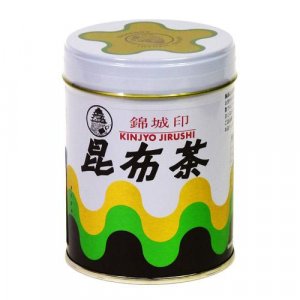
In some regions of Japan, it is made with yakisoba noodles in it but I preferred to keep it lighter.The result is a slightly crispy, chewy, veggie and seafood pancake. The ingredients were readily available, including the bonito flakes, but I could not find plain seaweed flakes for the life of me! I found furikake rice seasoning stuff but I could not find plain seaweed flakes. The aisles of the Japanese market had absolutely no rhyme or reason to it but after several rounds, I came upon this tin of seaweed powder.

Thinking that it was perhaps the same thing, I went ahead and bought it. It was evident when I got home that it was not the same thing and I ended up using rice seasoning on the okonomiyaki after all. It has been nearly a year hence and I totally forgot about the little tin of seaweed powder until today. To my delight, this is what I found!
"Kinjyo Jirushi Konbu Cha won awards from the Ministry of Aquaculture of Japan and Osaka City Government.
This is a savory tea made from dried konbu (seaweed) powder. You can drink it by just adding hot water. Since it has a touch of saltiness, some people use it in cooking to replace salt. The konbu (kelp) is known for containing an abundance of fibers, iodine, calcium, minerals, vitamins and iron. The charm of the Japanese women's black hair and skin is said to be related to the hormones secreted by the thyroid gland. Drinking this tea on a regular basis will help to regulate your hormone production and keep your skin and hair beautiful. Drinking Konbu Cha is believed to lower blood cholesterol, decrese constipation, and recover from exhaustion. In Japan, Konbu (kelp) is often seen at celebrating occasions to symbolize felicity. This is because the sound 'konbu' is similar to the word 'yorokobu' which means 'to rejoice' in Japanese." (source)
Very cool. My mom often made us a seaweed soup called "fa(1) chai(3)" that looks like black hair and told us that it'd make our hair darker and prettier. She also made us weird black dumplings filled with black sesame paste for the same reason. I used to think that all east Asians had naturally black hair but when I moved to SoCal, I discovered that there is a small minority of east Asians with naturally light hair ranging from honey brown to reddish brown. Even my full-blooded Chinese nephew had dishwater blonde hair for the first 2 years of his life that is only a deep brown even now. Maybe there is some truth to the seaweed after all.
Either way, I am happy that my little mistake yielded something new and fun for me to try. Use in place of salt? Why yes, indeed.